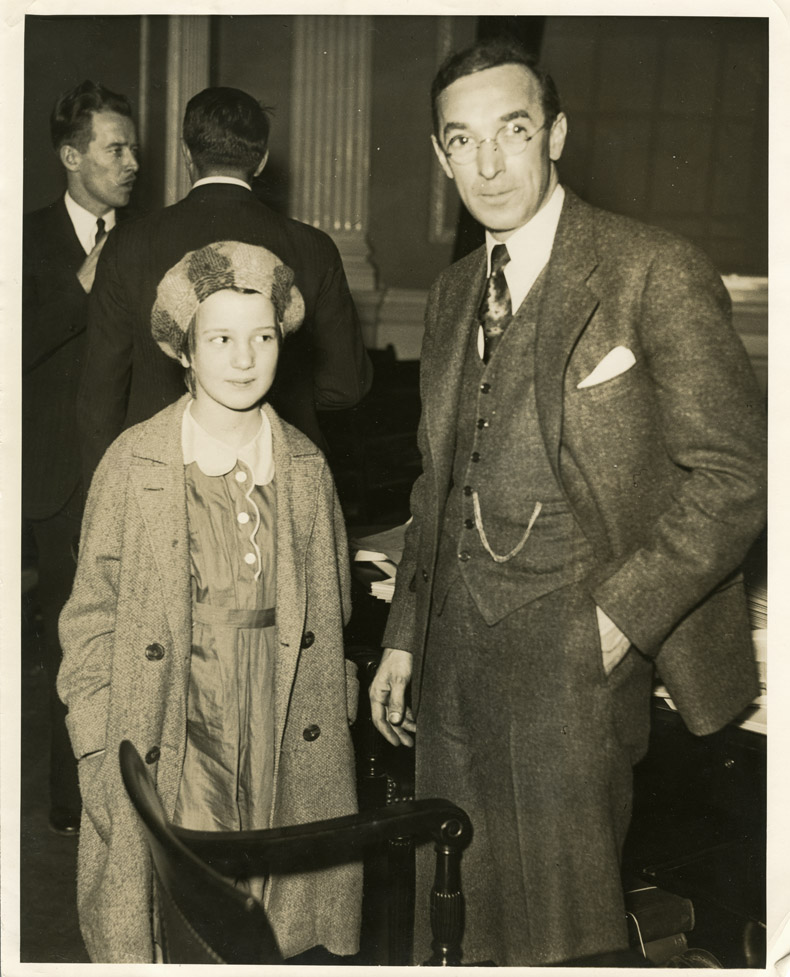Background on Norfolk Prison Colony

Howard B. Gill and daughter Joan at State House hearings on Norfolk Prison Colony
In the late 1920s, the sociologist and prisoner reformer Howard Belding Gill proposed building a "model community prison" at Norfolk, Mass., that would represent a radical new approach to dealing with the issues of crime and punishment. A noted efficiency expert who had been educated at Harvard and Harvard Business School, Gill was working on a study of prison industries for the federal government when he became convinced that prisons of the future could become something more than a place for retribution and punishment. By integrating social work and sociological theory into the workings of the prison system, he reasoned that that it would be possible to diagnose and treat the root problems that led to crime and redirect inmates toward constructive behaviors.
Construction on the Norfolk Prison Colony began in June 1927 using hand-picked inmates from the prison at Charlestown providing much of the labor. Working on an honor system, without restraints, the inmates completed the job in August 1932, and with Gill as superintendent, the new prison opened. At the outset, inmates at Norfolk were granted a significant voice in its operations. Working on a principle of joint responsibility, prisoners were represented by inmates' councils, were afforded, in the words of a supporter, Thomas O'Connor, "individual treatment, vocational and avocational work, private enterprises, academic education, case-work, visiting, punishment to fit the man and not the crime, [and] the discipline of community life replacing isolation and punishment." Inmates raised the produce they consumed on a prison farm, learned trades during their time behind bars, and were offered a full slate of recreational activities, including an orchestra, a newspaper, several athletic teams, and a debate squad that famously squared off against students from Harvard and MIT.
Although Gill's ideas garnered some support in political circles, opposition began to mount even before the facility opened, and as the economic crisis of the Great Depression worsened and public hysteria over crime peaked, the criticism hit a crescendo. The arrival of a group of hardened criminals from overcrowded Charlestown Prison during the fall 1933 -- over Gill's objections that they were not suitable for the Norfolk plan -- presented problems in discipline and security, and when the progressive Commissioner of Prisons Francis B. Sayre left office late in the year, opponents took the offensive against Gill's reformist ideas on penology, assailing Norfolk as a "country club" that coddled its inmates. While Governor Joseph Ely, appears to have sought to distance himself from the fray while he gauged public sentiment, the politically-ambitious State Auditor Francis X. Hurley mounted an all-out assault, issuing a "preliminary report on facts" in February 1934 that leveled 36 charges against Gill for alleged improprieties, ranging from a lack of integrity to mishandling civil service employees, falsifying records, and financial improprieties. Gill demanded a public hearing.
The hearing at the State House in early March was a minor media spectacle, with the progressive Gill set against a largely hostile political audience. Although nearly all of Hurley's accusations were discredited, the Governor (now come down on the side of Hurley) and other opponents seized on allegations of an "alcohol problem" at Norfolk and on news of the escape of four prisoners to condemn reform. Gill was forced to step aside.
Gill later held important posts at prisons in Washington and in the federal system and many of his ideas have been integrated into main-stream prison management. The Norfolk Prison Colony, now known as the Massachusetts Correctional Institute at Norfolk, is the largest prison in the state system with a daily population of over 1,500.








